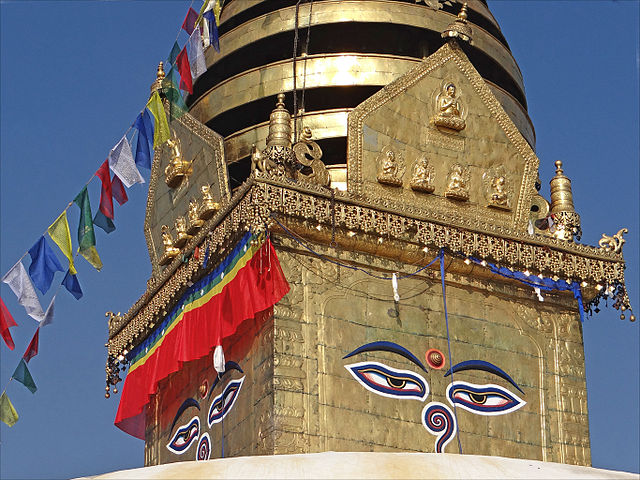The Eyes of Buddha (also called Buddha eyes or Wisdom eyes[1]) is a symbol used in Buddhist art. The symbol depicts two half-closed eyes, a style sometimes referred to as the Adamantine View (Sanskrit: Vajradrsti).[2] In between and slightly above the eyes is a circle or spiral which represents the urna,[3] one of the thirty-two characteristics of a great man (Sanskrit: Mahāpuruṣalakṣaṇa) in Buddhism.[2] Directly below the urna is a curly symbol stylized as १, which represents the number one in Devanagari numerals.[4][5] The curly symbol, which represents either a nose or a divine fire emanating from the urna above, symbolizes unity.[1]



The Eyes of Buddha symbol represents the all-seeing eyes of the Buddha,[6] or sometimes more specifically represents the eyes of the Ādibuddha.[1]
On stupas
The Eyes of Buddha are painted[7] onto the upper portions of many Tibetan-style stupas, mostly throughout Nepal.[1][8] The symbol is painted on all four sides of the cube at the top of the stupa to symbolize the Buddha's wisdom seeing all things in all four cardinal directions.[1] Two of the most well-known examples are the historic stupas at Swayambhunath[9] and Boudhanath,[10] which both comprise two of the seven Kathmandu Valley UNESCO World Heritage Site monuments located in Kathmandu in Nepal.[11]
Other uses
Similar to its use on stupas, the symbol is painted on the upper portion of many caityas.[2] The symbol is also sometimes inscribed on mani stones alongside the Sanskrit mantra Om mani padme hum as a form of prayer in Tibetan Buddhism.[12]
The Eyes of Buddha are painted on the silo housing the world's largest kaleidoscope, the Kaatskill Kaleidoscope in Mount Tremper, New York.[13]
References
Wikiwand in your browser!
Seamless Wikipedia browsing. On steroids.
Every time you click a link to Wikipedia, Wiktionary or Wikiquote in your browser's search results, it will show the modern Wikiwand interface.
Wikiwand extension is a five stars, simple, with minimum permission required to keep your browsing private, safe and transparent.
